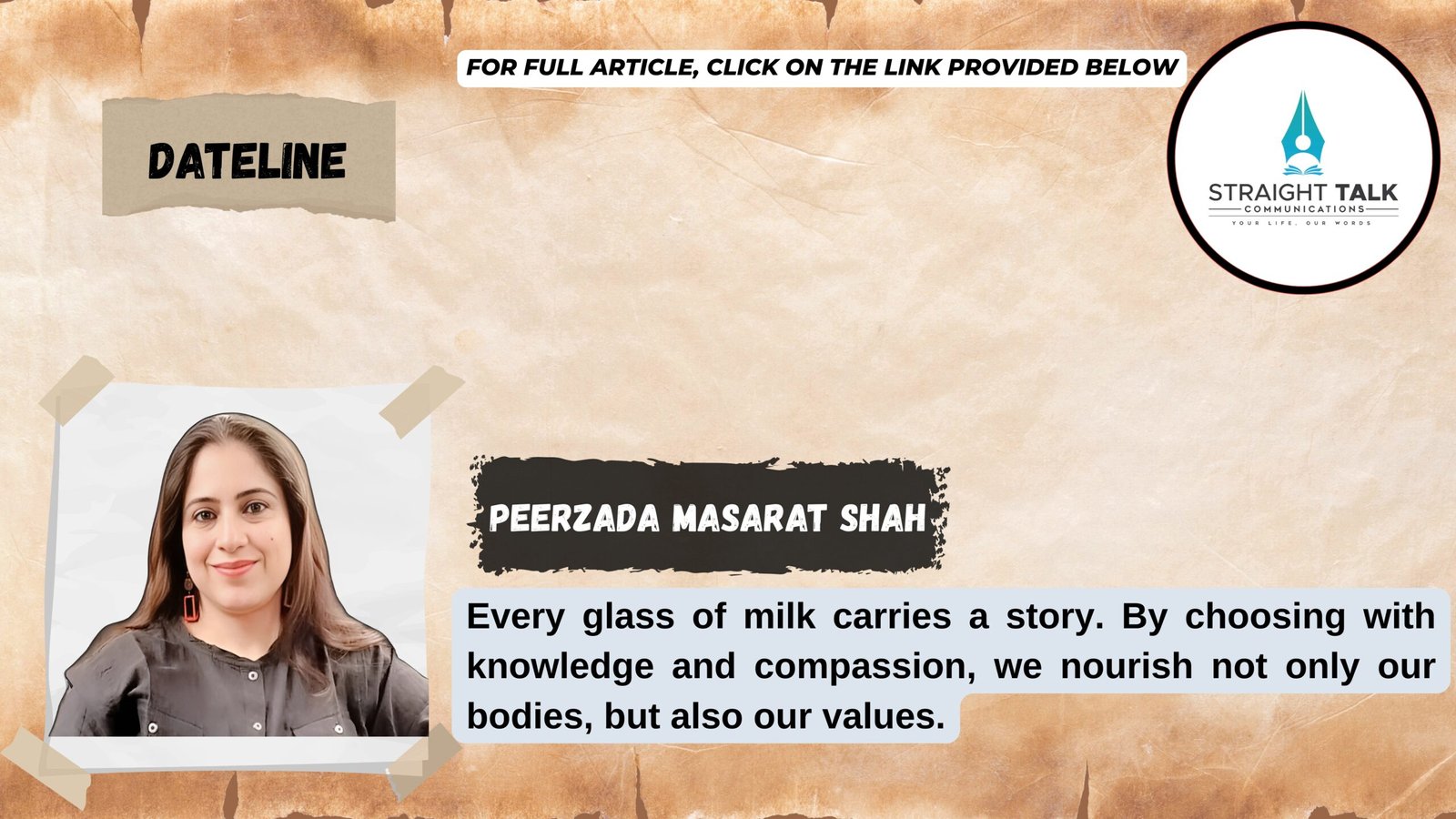Is Milk Truly Vegetarian? Navigating a Hidden Dilemma

Every glass of milk carries a story. By choosing with knowledge and compassion, we nourish not only our bodies, but also our values.
Peerzada Masarat Shah
In an era shaped by scientific discovery, ethical introspection, and ecological urgency, even the most familiar elements of daily life face deeper questioning. Among them, milk—long seen as a symbol of nourishment, purity, and tradition—now sits at the center of a profound debate. Once firmly embedded in vegetarian diets, milk is now prompting a crucial question: Can it still be called vegetarian, not just in theory, but in spirit?
Tradition Meets the Modern Dairy Industry
Across India and many parts of the world, milk holds a revered place. It is offered in temples, poured over sacred idols, and consumed daily in homes. For generations, it has represented health, vitality, and cultural identity. This heritage has nurtured the belief that milk is unquestionably vegetarian.
But that belief is now being challenged—not by extremists, but by spiritual seekers, environmentalists, and everyday individuals who value non-violence, transparency, and compassion.
The Journey of Milk: What We Often Don’t See
In natural settings, cows and buffaloes produce milk only after giving birth, to feed their calves. On commercial dairy farms, however, these animals are artificially inseminated repeatedly to ensure constant milk production. Calves are often taken away shortly after birth—sometimes within mere hours—causing immense psychological distress to both mother and child.
Male calves, seen as non-profitable, are often abandoned, sold, or slaughtered. Female calves are raised to replace their mothers in the cycle. When a cow’s milk output declines, she too is often sold off to slaughterhouses.
Behind the comforting image of milk lies a system many would find deeply disturbing if they saw it up close.
Hidden Non-Vegetarian Realities
While milk is not meat, the process of obtaining it involves significant harm. Many commercial animal feeds include animal-derived ingredients such as fish meal or bone meal. This means that even if the final product isn’t meat, its production is not free from non-vegetarian components.
Moreover, to maximize output, dairy animals are often injected with hormones and antibiotics. They are confined in tight spaces, denied natural movement, and live in conditions that contradict the principles of humane care.
For those who center their diets around ahimsa (non-violence), these practices make dairy consumption deeply problematic.
The Ethical and Spiritual Divide
Religions like Hinduism, Jainism, Buddhism, and Sikhism teach reverence for life and compassion for all beings. While many scriptures do not explicitly prohibit milk, the cruelty inherent in modern dairy production stands in stark contrast to the spiritual essence of these faiths.
Many monks, seekers, and ethical vegans are now avoiding dairy—not because of dietary trends, but out of moral conviction.
For them, abstaining from milk is not just about health; it’s about spiritual alignment with compassion.
Health and Environmental Considerations
A large portion of the global population, particularly in Asia and Africa, is lactose intolerant. For them, milk can lead to bloating, digestive issues, skin problems, and even long-term health concerns linked to hormones in dairy products.
Environmentally, the dairy industry is one of the top contributors to methane emissions, a greenhouse gas far more potent than carbon dioxide. It also demands immense amounts of water and grain—resources that could be used more efficiently in plant-based agriculture.
By contrast, plant-based alternatives like almond, soy, oat, and coconut milk have a lower environmental footprint, and offer a cruelty-free source of nutrition.
Toward Greater Awareness and Responsibility
This conversation isn’t about guilt or blame. It’s about informed choices. Most people have never been exposed to the inner workings of dairy farms. With clearer information, many would choose differently—not out of shame, but out of integrity.
There is a growing need for governments, religious institutions, and educational bodies to raise awareness. Honest labeling, ethical dairy certifications, and affordable plant-based options can empower people to make choices that reflect their values.
Redefining Vegetarianism in the 21st Century
Today, being vegetarian isn’t just about abstaining from meat. It’s about minimizing harm, asking deeper questions about where our food comes from, how it’s made, and whether it reflects our principles.
Definitions must evolve with understanding. In this light, milk—though not meat—may no longer qualify as vegetarian in the ethical or spiritual sense.
Conclusion: A Conscious Choice
The milk dilemma isn’t about radicalism—it’s about reflection. Whether one chooses to continue drinking milk or transitions to plant-based options, the essential thing is awareness.
Every glass of milk carries a story. By choosing with knowledge and compassion, we nourish not only our bodies, but also our values. And perhaps, glass by glass, we move closer to a gentler, more conscious world.







